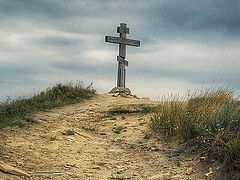Thanks be unto God for His unspeakable gift (2 Cor. 9:15).
The love cherished in your hearts on this significant day for us,1 wanted to manifest itself by a visible sign. Such is the property of true love: It can’t hide in the heart for long—it will certainly come out and reveal itself in some way. The gift of your love is beautiful, but more beautiful is love itself. Its greatness is incomparable; it knows no bounds. God Himself is pleased to be called by its name. Love isn’t simply a property of God, but His essence: God is love; and he that dwelleth in love dwelleth in God (1 Jn. 4:16).
Love is the source of blessedness. Is not the blessedness of the Most Blessed Theotokos found in love? Is not the blessedness of the Father found in the love of the Son, in Whom He sees Himself, His wisdom, His power? Is it not in the love of the Father that we find the blessedness of the Son, to Whom the Father reveals all things (Jn. 5:20), by Whom He creates all things, and in Whom all His love reposes? Is not the Holy Spirit ever with the Father and the Son—the Spirit Who is Life from Life and Life-giving, Who proceeds from the Father and Whose love reposes in the Son?
By love, everything is called from non-existence into existence. The love of God preserves everything, takes care of everything. Love and beatitude live inseparably. Where there is love there is beatitude; where there is beatitude there is love.
In love is the happiness of married life. In love is the happiness of family life. How warm, how bright it is among those who are characterized by love for others, where love lays down its life for its friends!
Love brought the Son of God down to earth; love raised Him up upon the Cross. Love united Heaven and earth; love has gathered together all that was ruined: from the heavenly and earthly, angels and men; love has formed the Church under a single head—the God-Man.
Love is a universal force that unites everything. All of the separate parts of the boundless world are connected with each other by love: Nothing lives only for itself, but everything serves for others and is supported by others. It’s not the struggle of the strong against the weak, not the war for self-existence that preserves the existence and order of the world, but service to others. It’s not the struggle of the mother with the child that preserves life, but the mother’s love for the child to the point of selflessness. The sun doesn’t shine and warm for itself; water doesn’t quench itself, but others. The tsar lives by his subjects, the subjects by the tsar, and their happiness is in their complete unity. Children live by their parents, and the happiness of parents is children; the support of their old age is their sons and grandsons. The happiness of children is their parents: Children are happy, contented, and calm with them. Obviously, it’s not the law of struggle that prevails here, but the law of love, of self-sacrifice for the good of others.
However, together with this law of self-sacrifice, there’s another universal law—the law of self-preservation. Here the law of love is as if divided in twain: love as life for others and love as life for yourself. But these two laws aren’t mutually exclusive; they don’t destroy each other, but only limit each other and thereby equalize the life of creatures. As light and darkness, heat and cold exist side-by-side, so do the laws of self-sacrifice for the good of others and of self-preservation for the good of ourselves.
We are speaking about these two laws because nowadays some teach that everything that exists is held together by one law, which they call “survival of the fittest.” Thus, they deny the meaning of the law of self-renunciation for the benefit of others; although this law, like life for others, or self-sacrifice, is of paramount importance. But when, as a result of sinful damage to their nature, people began to be guided in their lives primarily by the law of self-preservation, and therefore began to enter into a struggle for their existence and consequently began to neglect the law of self-sacrifice, the law of love—then the harmony in the world of rational beings was upset; the harmonious order of their lives was disrupted, as was their happiness. Instead of love, enmity appeared. Everyone began to care only for themselves, forgetting about others. Everyone began to arrange their own happiness, even if by harming others.
Lawlessness has multiplied—love has dried up; love has departed from me—as has happiness. Instead of being one body and one soul, spouses have split in two and begun to feud with each other: The stronger has begun to offend the weaker, and the weaker to take revenge on the stronger. Children rebel against their parents and parents against their children; brothers cease to be brothers, becoming only neighbors; the rich oppress the poor, and the poor steal from the rich. The boss is prideful before his subordinates, and the subordinate is hypocritical before his boss. It’s become cramped, cold, and difficult for everyone. And all of this is because love has dried up.
But the Lord lives, and His Church lives, which is His Body: The truth of the Lord abides in it forever, and grace abides in it forever. The love of Christ abides with the Church as its head forever, and the love between members of the Church, as members of the Body of Christ, will never be lacking. This love between members, between pastors and their flocks, can’t disappear forever, although sometimes it’s weakened because of sin; but by the power of grace of Christ abiding in the Church, this love, this unity is restored again, and the spark of love, hidden under ashes of human infirmity, is ignited and inflamed by the power of the grace of Christ. Once inflamed, it can no longer hide in hearts, but comes out and manifests itself in various kinds of love: in people caring for others, and in the submission of those being cared for. The former manifest their love in serving for the salvation of others to the point of selflessness, and the latter in their desire to hear instructions and to unflinchingly follow the advice of their mentor.
It’s this love, my beloved, that has moved you to do what you’ve done for us, giving your attention to our humility on this wonderful day for us.
Thank God for His ineffable gift—the gift of love, which is happiness on earth and blessedness in Heaven! Our hearts are filled with gratitude to you, my beloved, for the gift of your love, for your love of Jesus Christ, Whom the Church glorifies forever.




